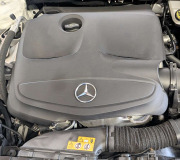Yup. You are putting new shoe laces on a pair shoes when it is the holes in the bottom that are letting water leak in. You are putting rocket fuel in a rocket that has already crashed. You are still typing on a Lenovo G50 laptop that has already been smashed and thrown against the wall out of frustration over the extremely miserable keyboard! Do you get my meaning?
If you think some mechanic-in-a-can is going to solve this problem even a little, be very sure you do not drive any further than you are willing to walk back home. Once this damage starts, parts continue to be destroyed at an ever-increasing rate. What you will end up with is fewer and fewer parts will be reusable to the point it does not pay to rebuild the engine. Right now it is a good bet connecting rod bearings are needed. Imagine a 3" long nail needs to be pounded into a board, but with the hammer on the nail's head, you only have 2" to swing that hammer. The nail is not going to move very far with each blow. That equates to that.006" clearance I mentioned earlier. If you tap on that nail all day, eventually it will sink in a half inch. Now you can swing the hammer 2 1/2". The bigger swing means you can drive the nail in further with each blow. The more pounding you do, the more the nail moves with each blow. The more pounding takes place between the connecting rod and the crankshaft journal, the more wear takes place with each blow. Within two or three miles, the connecting rods will be distorted beyond the point where they can be machined and reused.
The soft aluminum pistons are already scuffed, and metal chunks have collected in the piston ring grooves. No chemical is going to fix that. Their rough surfaces will gouge the cylinder walls, so the cylinders will need to be bored to a standard oversize. The valve stems have already been run dry, so there will be excessive clearance between the stems and guides. The camshaft lobes will be scuffed and will deteriorate rapidly. Adding oil now won't stop that wear from continuing and accelerating.
If you are going to do anything, dump in the highest viscosity oil you can find, then see how far you can get. Instead of a rebuild, it would make more sense to find a good used engine from a salvage yard. Chrysler has built a lot of really tough engines over the years, but even they need oil.
Another solution you might consider is renting a car, then looking for a community college with an "Automotive" program. In my school, we were always looking for live work to give our students real-world experience. We charged $10.00 per hour for what the job was supposed to take, and we got parts at real good discounts, then marked them up ten percent to form a "breakage" fund in case we damaged something.
The trade-off for the low repair cost is it will take weeks to get your car back because the students are only in the shop for a few hours per day. Also, we only taught "Engine Repair" once a year, for eight weeks. Your repair must fit what we are currently teaching. We would not do a brake job, for example, when we were teaching "Automatic Transmissions". To do so would take work away from the shop owners who hire our graduates.
Our students were very responsible and well-supervised, but they do not have the experience of older mechanics. Simply replacing an engine might not provide much of a learning experience compared to rebuilding it, but if they are hard up for appropriate jobs, this might be a solution worth looking into.
Thursday, December 29th, 2016 AT 1:32 PM



